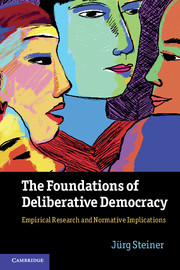Book contents
- Frontmatter
- Contents
- Figures
- Acknowledgments
- Introduction
- 1 Citizen participation in deliberation
- 2 Rationality and stories in deliberative justification
- 3 Common good and self-interest in deliberative justification
- 4 Respect in deliberation
- 5 Public openness of deliberation
- 6 Force of better argument in deliberation
- 7 Truthfulness in deliberation
- 8 Deliberation in the media and the Internet
- 9 Favorable conditions for deliberation
- 10 Favorable consequences of deliberation
- 11 The praxis of deliberation
- Appendix Newest version of Discourse Quality Index (DQI)
- Index
- References
Introduction
Published online by Cambridge University Press: 05 August 2012
- Frontmatter
- Contents
- Figures
- Acknowledgments
- Introduction
- 1 Citizen participation in deliberation
- 2 Rationality and stories in deliberative justification
- 3 Common good and self-interest in deliberative justification
- 4 Respect in deliberation
- 5 Public openness of deliberation
- 6 Force of better argument in deliberation
- 7 Truthfulness in deliberation
- 8 Deliberation in the media and the Internet
- 9 Favorable conditions for deliberation
- 10 Favorable consequences of deliberation
- 11 The praxis of deliberation
- Appendix Newest version of Discourse Quality Index (DQI)
- Index
- References
Summary
The deliberative model of democracy was initially developed at a normative philosophical level. Many claims were made about favorable antecedents and the beneficial consequences of a high level of deliberation. In recent years, some of these claims have been subjected to empirical tests. In this book, I look at the interplay between normative and empirical aspects of deliberation. Empirical data, of course, cannot solve normative questions, but they can throw new light on such questions. I come from the empirical side, so I do not claim to write as a professional philosopher; I will instead take the perspective of an engaged citizen in the sense of the French citoyen engagé. I will begin my normative stance not with ultimate philosophical premises but will proceed with pragmatic reflections on what empirical findings may mean for the role of deliberation in a viable democracy. Let me make clear at the outset that it is not my view that a viable democracy should consist only of deliberation. Thus, the concept of deliberative democracy in the title of this book does not mean that this form of democracy consists only of deliberation: it only means that deliberation has an important role. Besides deliberation, a viable democracy must have space, in particular, for competitive elections, strategic bargaining, aggregative votes, and street protests. The trick is to find the right mix among all these elements, and this will depend on the context. I will argue that in this mix the role of deliberation is often not strong enough and must be strengthened.
- Type
- Chapter
- Information
- The Foundations of Deliberative DemocracyEmpirical Research and Normative Implications, pp. 1 - 31Publisher: Cambridge University PressPrint publication year: 2012



